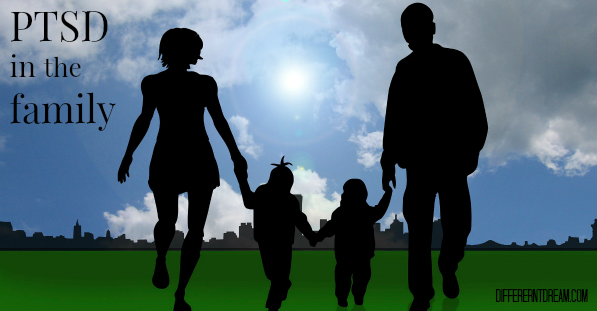PTSD in the Entire Family

PTSD in the entire family? Can it happen? Today’s guest blogger, who is writing anonymously to protect her family, describes how PTSD in the entire family is a reality at their house.
PTSD in the Entire Family
I first recognized the problem in my daughter.
After multiple surgeries and hospital admissions for emerging illnesses, my daughter understandably displayed signs of stress and anxiety related to medical traumas. She was subjected to necessary tests, blood draws, respiratory support, x-rays, and things familiar with hospital stays.
Symptoms of her PTSD came on around age 6. I first thought it was a coincidence when she had an accident upon arriving at the hospital parking garage for routine care. Then a clear pattern emerged. Being developmentally disabled, her simple messages of “doctor,” “hurt,” and “scared” clued me into what she was thinking. A few years later, she simply, but powerfully, began refusing to get out of my vehicle at the hospital. The journey from the parking lot to the hospital was strenuous for both of us for years.
I was slow to admit how my daughter’s health scares impacted me. I noticed an intense ache in my arms and hands when I arrived at the hospital for her routine appointments. I came to realize I was holding the steering wheel with such a tight grip during the drive that I was causing myself pain. My body, it seemed, went into stress mode automatically from previous traumatic drives I made to the hospital while my child was being transported via an ambulance or helicopter. At home, I experienced nightmares centered around the hospital and ICU following her admissions. Anxiety would not relent even when health scares were over.
As I tried to understand what was happening with me, my son’s struggles emerged. Being the little brother, he spent his childhood tagging along to appointments and visiting hospital rooms. My husband and I tried to shield him from certain things, but the hospital has been an inevitable part of his life too.
The reality of his situation became known after visiting his sister in the hospital at age 9. Through tears, he confessed his fear of getting sick and ending up in the ICU. At school, he couldn’t concentrate. At home, nightmares had been torturing him. He nervously bit his nails and asked when we would return home from routine appointments. He was fearful we wouldn’t come home from scheduled appointments. I failed to realize how much it weighed upon him. His mental health could no longer be ignored.
Recognition of a problem and getting help for all of us was important. I needed medication for a period of time to manage the stress and anxiety I ignored for years. My son benefited from counseling to treat his anxiety. My daughter is a little more complex but understanding the anxiety behind her behaviors has made a crucial difference.
If you see similar patterns in your family, don’t ignore them. It is tempting to put off mental health issues, especially as medical ones seem more pressing. But don’t ignore the signs of PTSD in the entire family.
Seek help.
Ask questions.
It can get better.
Do you like what you see at DifferentDream.com? You can receive more great content by subscribing to the quarterly Different Dream newsletter and signing up for the daily RSS feed delivered to your email inbox. You can sign up for the first in the pop up box and the second at the bottom of this page.
By admin
Subscribe for Updates from Jolene
Related Posts
How Do I Let Go of My Adult EA/TEF Child?
Valeria Conshafter explores the question “How do I let go of my adult EA/TEF child?” for EA/TEF Awareness Month.
The Physical Manifestations of Grief in Caregivers
Jolene explains how the heaviness of loss and sorrow can contribute to the physical manifestations of grief in caregivers.
Experiencing Post-Traumatic Growth while Raising a Child with Disabilities
Jolene explains the benefits of experiencing post-traumatic growth while raising a child with disabilities.






0 Comments